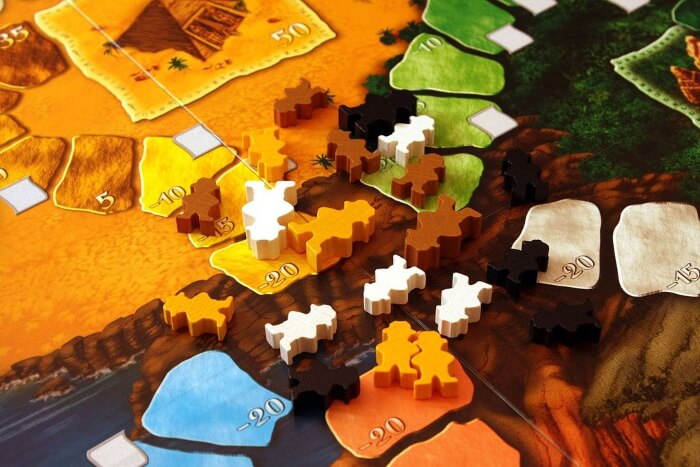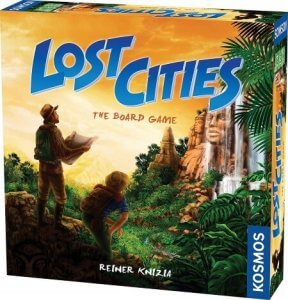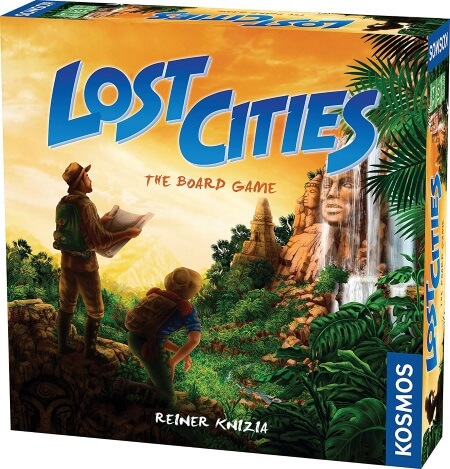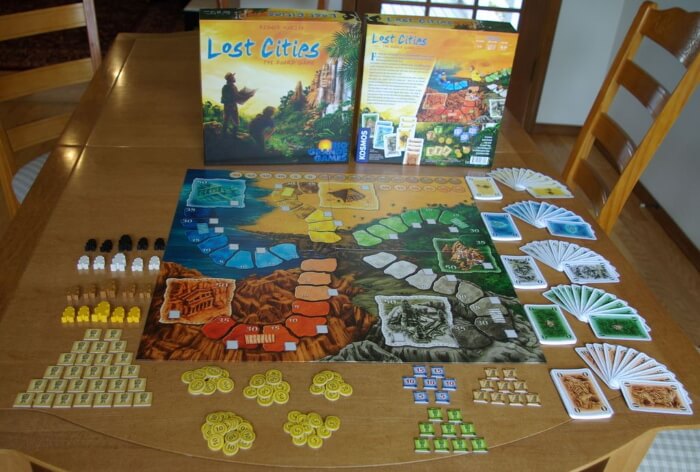Lost Cities at a Glance
| Game Type Adventure, Card Drafting, Hand Management | Play Time 60 mins | Skill/Complexity (2 - 5) Light |
| Age 8+ | Publisher(s) Rio Grande Games, Kosmos | Published 2008 |
| Categories Family | Players 2 - 4 | Rules Manual 2 Player Rules PDF 4 Player Rules PDF |
| Our Rating 8.5/10 | Cost $33.99 approx |
About – Description
The Lost Cities board game was released in 2008 and based on the card game that was released in 1999.
It was designed by Reiner Knizia and is based around an adventure and exploration theme that is aimed at players aged 8 and over. It takes around an hour to play and can be played by anything from 2-4 players.

Who’s it best suited for?
This exciting board game allows children and families to embark on an adventure while playing Lost Cities. The simple approach of the game and the age from which it can be played can give children an insight into how more intricate board games work and play.
Skill – Complexity
Lost Cities has a relatively low complexity when it comes to playing the game and that makes it ideal for families and children. Players will need to follow the instructions on the cards and move along the board but there is no prior knowledge or skill required.
Lost Cities is also a very good game choice for 2 players.
Set Up – Playing Rules & Instructions
In the box is a game board, 110 cards in five colors, 25 event tiles, 4 sets of explorer pieces, 64 victory tokens and 27 artifact tokens.
Each player can take a team of explorers on as many as five expeditions. To move along an expedition path, the car in the color of the path must be played for every step forward, however, the card has to be worth more or be equal to that of the player who previously moved along the path.
After playing, the player picks another card and then team leaders determine whether to play, hold or discard their cards in order to move their team forward while ensuring that they prevent the opposition from moving ahead.
Players are given points that are determined by how far they move along the path, with every step earning more points than the previous step. Players can increase their points by finding artifacts, victory points and shortcuts.
At the end of the game, the player with the most points is classed as the winner.
Versions – Editions
The game is based around the card game released in 1999 and several versions of the board game have been released in several countries.
Likes & Dislikes
- Beautiful artwork
- Players seem to love this game especially those who are familiar with the card game.
- You might enjoy the way that it balances luck with strategy yet it is not too difficult for children to play while the instructions are simple to learn.
- It’s great to have a game that does not require overthinking and still engages so well.
- Makes a good gateway game for introducing others to board games.
- Some players felt that the game can take longer than an hour to play while some feel that it should be aimed at an older audience.
Final Thoughts
This is an intriguing game of strategy and simple features which makes it appeal to not just a younger audience but also an audience that wants a simple yet rewarding game. The setup and instructions are simple and that means that the game can be played to fill up those spare hours.
Also – an excellent 2 player game.





